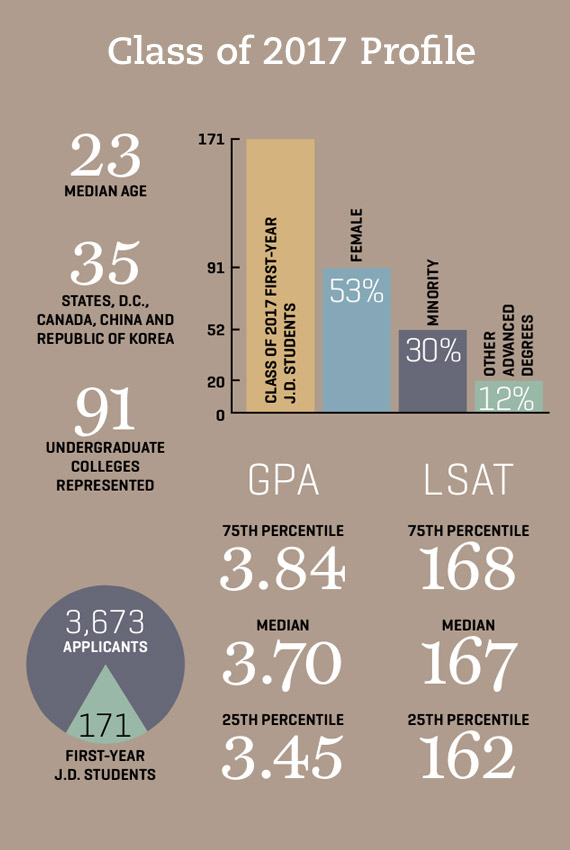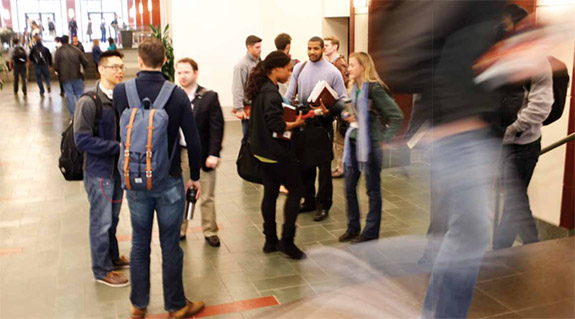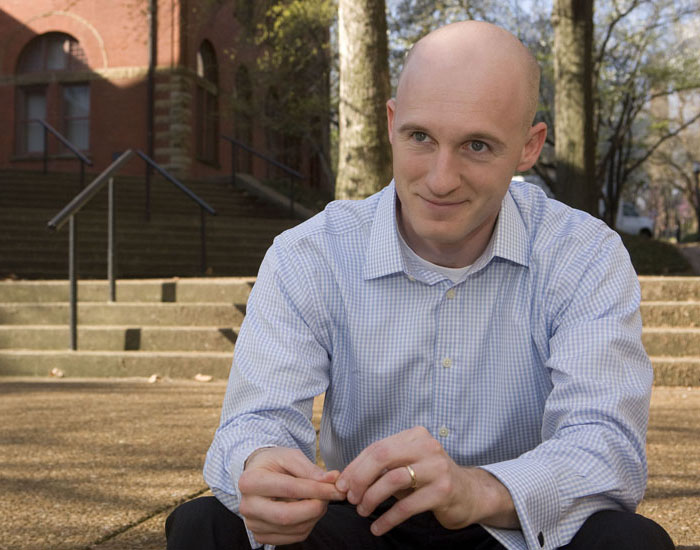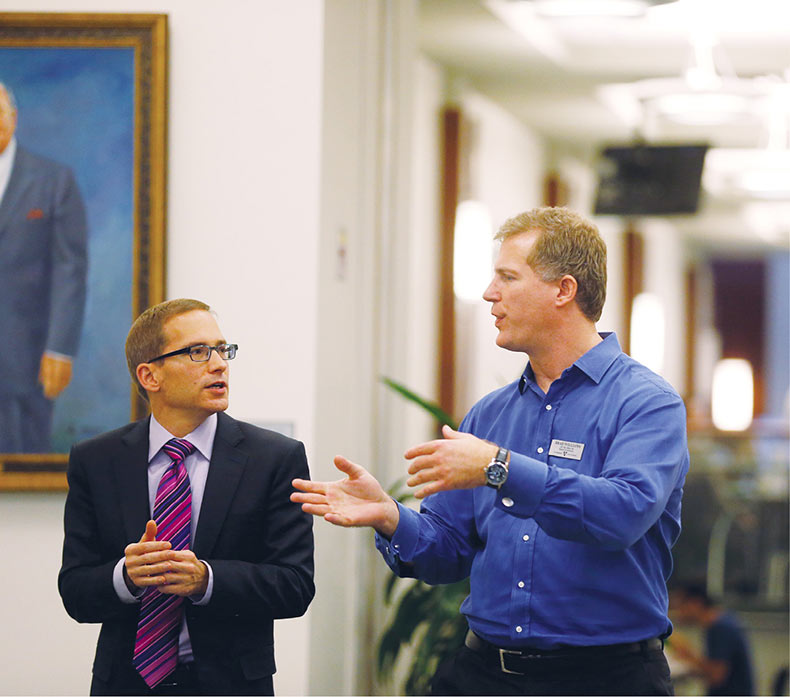Dean Chris Guthrie talks candidly about the challenges and rewards of leading Vanderbilt Law School.
By Grace Renshaw

Since becoming Vanderbilt’s dean in July 2009, Chris Guthrie has navigated the law school through a historically challenging legal job market, an unprecedented decline in law school applications, and a rapid evolution in the way legal services are delivered. He has logged hundreds of thousands of miles visiting alumni and employers, supporting admissions and career placement efforts, and recruiting 16 new professors—including three Vanderbilt Law alumni—to the faculty. Along the way, he has coped with a thousand-year flood and mourned the deaths of three beloved faculty. Dean Guthrie’s second five-year term began in July. In this interview, he talks candidly about his first five years as Vanderbilt Law School’s dean.
You became dean in summer 2009, the year after the economic downturn. Can you talk about the specific challenges the law school was facing at that time?
Vanderbilt was in a really good position going into the economic downturn. As the global financial crisis unfolded, we knew the next couple of years would be difficult. But we did not know that the legal job market would contract so dramatically.So on my first day as dean, we needed to quickly deploy new resources to help our students get jobs. And, unrelated to the downturn, several beloved professors who had spent their careers here and mentored generations of students—Tom McCoy, Bob Belton, Jim Ely, Don Hall and Jon Bruce—retired around that time, so we had to recruit great teachers to replace them.
How did you meet those challenges?
Helping our students with their job searches was a major priority. We launched our Public Service Initiative, which provides stipends that enable unemployed graduates to work in unpaid public interest positions, gain experience, make contacts and find permanent jobs. The PSI has been an effective springboard to employment. We also expanded our already strong Career Services team. We reached out aggressively to alumni and friends for help in placing our students—and they responded. And we participated in more off-campus job fairs to give our students additional opportunities to reach employers in major markets. The legal job market, particularly for entry-level lawyers, remains challenging, but we have seen some successes. Last year, we ranked 10th in the country in placement of full-time, long-term, bar-required positions. We have also had tremendous success placing our students in prestigious clerkships, generally ranking in the top dozen schools based on the percentage of our graduates securing federal judicial clerkships.
[lquotealone]“My job after college enabled me to see universities all over the country, and my visit to Vanderbilt was the reason I applied to VLS. I fell in love with Vanderbilt when I visited.” —Mary Nicoletta, Class of 2015, 2014–15 Executive Editor of the Vanderbilt Law Review [/lquotealone]
Predictably, the rapidly deteriorating legal job market led to an unprecedented decline in law school applicants. Like most of our peers, our applicant pool peaked in 2010. But fortunately, we haven’t seen the declines that many schools have faced; we currently receive more than 20 applications for each seat in our first-year class. We have ramped up student recruiting, and our alumni interviewers play a vital role each year in helping us recruit the right applicants. Today you would be hard-pressed to find any students as talented or as fun to teach or to work with once they graduate. We also expanded our outstanding LL.M. program for foreign attorneys, which enhances the educational environment for all students and increases our global reach. We enrolled 53 LL.M. students from 13 countries for the Class of 2015.

At the same time, we have recruited 16 incredibly talented new faculty, and those faculty have already made their mark on the school. Ed Cheng, who joined us in 2010, has won three Hall-Hartman Awards for teaching. Chris Serkin, who joined us last year, won two Hall-Hartman Awards in his first year of teaching here—a remarkable achievement.We accomplished all of this while keeping our costs under control. During the past five years, our tuition increases have been historically low and our financial aid packages have been extremely competitive. Vanderbilt is now, relatively speaking, a value proposition. Our tuition and mandatory fees, net of financial aid, are estimated to be the lowest of the top 20 law schools as ranked by U.S. News. This gives us a big competitive advantage: We offer an elite, top-tier legal education on par or superior to competing schools where annual costs are significantly higher. Increasing student financial aid is a major priority, and our alumni and friends have stepped up to help. During my tenure, our donors have endowed 12 new named scholarships. Another eight will soon be fully endowed and available to students. These new scholarships—along with additional gifts to existing scholarship funds, increased Annual Fund giving, and annually funded scholarships—have had a positive impact. Today, most of our students receive scholarship support; the median scholarship is $20,000 per year—slightly less than half of tuition—and our students’ average indebtedness at graduation declined from 2012 to 2013.
How important to the law school is giving?
Gifts are absolutely vital. No law school, public or private, can be competitive without robust support from alumni and friends. Each year, 10 to 15 percent of our budget comes from gifts, making them second only to tuition as a source of support for the school. To make the impact more concrete, we renew the Public Service Initiative each year based on available Annual Fund dollars.Leadership gifts have helped us in all areas. Some recent examples: Charlie ’75 (BA’72) and Lucy Cox (BA’75) and their family, including Allie Cox ’11 (BA’08), endowed our first new chair since 2006, which has allowed us to recognize and support a deserving faculty member. Bob Reder ’78 endowed the Enterprise Fund to support faculty research and development—an important new tool for investing in and retaining our faculty talent. And Frank ’79 (BA’76) and Amy (BA’79) Garrison have invested more than $1 million in our social justice program, endowing summer stipends and scholarships that equip students to pursue careers in the public interest.
[fullquote]In 2009, as Chris was getting ready to assume leadership as dean of the law school, he stopped by to ask, “How are we dealing with the downturn in hiring?” He suggested a bridge program, the result of which is the Public Service Initiative for those who graduate without permanent employment. His foresight made Vanderbilt an early player in assisting students to serve the community and to connect with permanent employers. Today, bridge programs are common, and a number of them have taken inspiration from Vanderbilt’s. In addition, Chris has the most stylish tie collection that any of us in Career Services has ever seen. —Elizabeth Workman, Assistant Dean for Career Services[/fullquote]
So it sounds like giving is going well?
Thanks to generous donors and a devoted development staff, we have had significant success in recent years. In three of the past four years, we have set Annual Fund records. This year, alumni and friends made unrestricted gifts of more than $1.4 million, eclipsing our prior record by more than $100,000. Our total giving, which includes Annual Fund gifts and gifts restricted to particular endowments and programs, has also been strong. In fact, the past two years have been among the three best fundraising years in our history.

[rquotealone]“Chris Guthrie is a polymath dean. His composure, wisdom, extraordinary insights and good humor knit all of our separate efforts and roles into a whole that is much greater than the sum of its individual parts.” —Todd Morton, Assistant Dean for Admissions[/rquotealone]
How does this performance compare to peer law schools?
Our alumni are deeply loyal, and their positive experiences as students and alumni mean that our giving participation levels are the envy of nearly all our competitors. Only a handful of schools report higher annual participation rates.
However, we do not raise nearly as much money as most elite law schools with which we compete. For example, I earned my J.D. at Stanford. With a similar number of alumni, Stanford raised just shy of $22.5 million in new gifts and pledges in 2013, compared with $5.2 million for Vanderbilt—and that’s a good year for us! We generally lag behind other elite schools in critical indicators like average size of gifts, total annual fundraising, and endowment dollars per student. Faculty recruiting and retention is the lifeblood of any law school, and we are among the “least chaired” of our peer law schools. Duke, for example, has 25 fully endowed faculty chairs, while we have only 11. In the last five years, we’ve solidified our position among the best law schools. One of my primary goals is to secure transformative gifts that give our students and faculty resources that rival those at our wealthier competitors. Since our alumni are every bit as successful and accomplished as graduates of other elite law schools, I believe we can translate their deep affinity into the seven- and eight-figure gifts that other top law schools regularly announce. I will certainly be evaluating my own performance as dean, in no small measure, based on our success in securing these vital resources. And, although I am not in a position to give at those levels, I intend to lead by example; I meet the Board of Advisors minimum giving expectation of $10,000 annually, and Tracey and I recently pledged to endow a scholarship over the next few years.

[fullquote]“Vanderbilt’s faculty is one of its defining strengths. Vanderbilt Law professors are high performing and very capable on a professional, intellectual level, but they are also very approachable and friendly.” —Rick Apple, J.D./MBA ’12, COO of SETEL UC [/fullquote]
How do you feel about the future of VLS in particular and the legal practice as a whole? Is a law degree a good investment?
Vanderbilt Law School is a great investment. The world will always need brilliant, technically skilled and personable advocates, which we excel at producing. I don’t have a crystal ball, but I am bullish on the core competencies that a Vanderbilt legal education provides—critical thinking, careful analysis, clear writing and strong presentation skills. I’m confident that our graduates will continue to excel as practitioners, business people and community leaders.
There has been a lot of talk in the press and the legal community about transforming legal education, including discussions of radical measures to change how a legal education is delivered. I think this conversation has become overheated. Great schools like Vanderbilt have been working for years to make our full suite of offerings more relevant. For example, our Law and Business program, headed by Randall Thomas, was an early leader in offering students with an interest in business law the ability to follow a clear path to expertise in this area. Each year, nearly a third of our graduates earn the Law and Business Certificate. This year, we launched a J.D./Master’s in Finance joint-degree program with the Owen Graduate School of Management—a perfect example of the kind of interdisciplinary synergies we have at Vanderbilt. This degree will allow students to graduate in three years with two valuable skill sets.
Our Environmental, Energy and Land Use Law program and our Law and Neuroscience program are already among the best in the world. All they lack is the resources to drive even more productive partnerships across our campus. We offer our students an ever-expanding array of “real world” experiences through clinics, externships and simulation classes taught by elite practitioners. We have the potential to become the go-to school in our region for students interested in public interest careers—we just need the resources to do it.
[fullquote]“The Board of Advisors plays a crucial role by offering advice and counsel as our academic programs evolve, investing in the school financially, and encouraging others to do the same. They also reach out to strong prospective students and mentor current students and recent graduates.” —Dean Chris Guthrie, shown below with Board of Advisors member Brad Williams, J.D./MBA ’94, of Tudor Investment Corp.[/fullquote]

In a deanship filled with challenges, has there been a low point?
Every year presents unique challenges, but 2010 was particularly difficult for everyone here. In May—during finals—Nashville had a 1,000-year flood. Some students, staff and faculty were flooded out of their homes. One student barely escaped his house with his dog, and the law school suffered damage that affected a number of students. In October, Richard Nagareda, a David Daniels Allen Professor of Law and director of the Branstetter Litigation and Dispute Resolution Program, died unexpectedly. Richard was a close friend and valued colleague, and his loss was devastating for our faculty and for his current and former students. Two months later, Chris Lantz, president of the Vanderbilt Bar Association and a beloved member of our community, died tragically in a snowmobiling accident during winter break.
[rquotealone]“Vanderbilt teaches its students to be team players, in and out of the classroom. That was the case when I was there more than 25 years ago, and it still is. Even more than when I was in law school, I’ve come to value how unique and special Vanderbilt is and how well it prepares students to succeed.” —Richard R. Hays ’86, Managing Partner, Alston & Bird[/rquotealone]
I will forever remember presiding over memorial services for Richard and Chris at the law school and traveling to Oakland, Maryland, for Chris’ funeral on New Year’s Eve. And I will always be grateful to our faculty, students and staff, who supported me and one another during this extremely sad time.
Is there anything about being dean that you don’t like?
I prefer casual dress to business attire, and this job requires me to wear a suit more often than not. I’m sometimes teased about my colorful ties, but if I’m going to have to wear a suit, I’m going to wear a tie I like, and I like brightly colored, abstract ties. Deans travel a lot—which I really enjoy—but that means I attend lots of lunches, dinners and receptions with delicious food and drink. I have to be mindful of my middle-aged metabolism.
What has made you happiest in the last five years?
Our son, Elliot, who was born in 2010. Parenting is an extremely humbling and challenging experience, but nothing has brought me as much joy.

Chris Guthrie, pictured here with Tracey George and their son, Elliot, joined Vanderbilt’s law faculty in 2002. Within two years, Dean Kent Syverud asked Guthrie to serve as his associate dean for academic affairs, a post he held until 2008. A leading expert
on behavioral law and economics, dispute resolution, negotiation and judicial decision making, Guthrie ranks among the most frequently cited scholars in his fields.
Guthrie practiced at Fenwick & West in Palo Alto, California, before becoming a law professor. He earned his undergraduate and law degrees from Stanford and holds a master’s in education from Harvard. Throughout his career, he has won multiple teaching awards as well as national recognition for his scholarship.